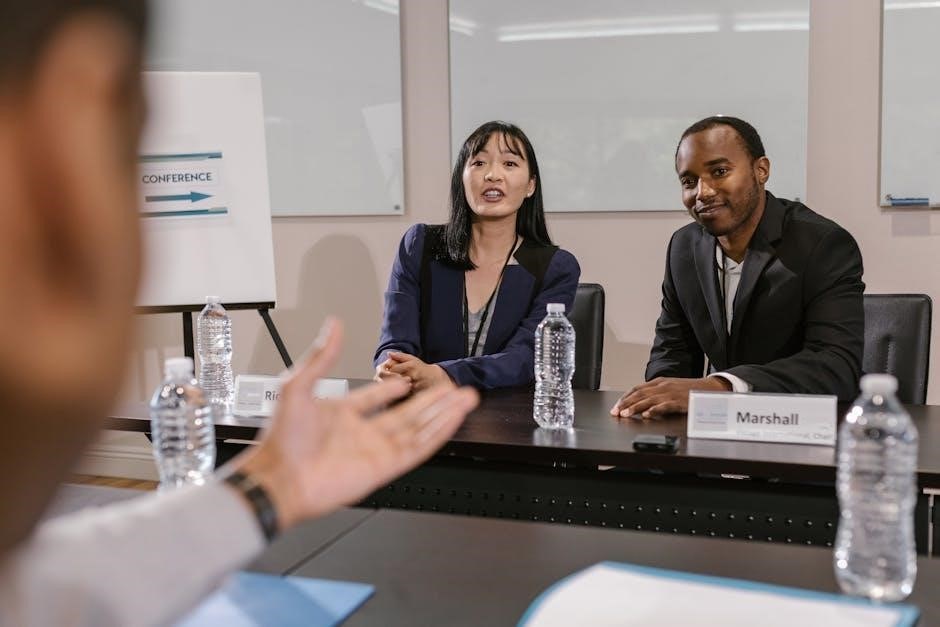Preparing for a principal interview requires a deep understanding of educational leadership and strategic planning. This guide offers insights into key questions‚ sample answers‚ and preparation strategies to help aspiring principals succeed.
Overview of the Importance of Preparation
Preparation is critical for a principal interview‚ as it demonstrates professionalism and readiness for the role. Researching the school’s mission‚ improvement plan‚ and challenges ensures alignment with their needs. Understanding common questions‚ such as vision development and conflict resolution‚ allows for confident responses. Practicing scenarios highlights problem-solving skills and leadership abilities. A well-prepared candidate can articulate their educational philosophy‚ share success stories‚ and present a clear vision for the school. Preparation also shows respect for the interview panel and the school community. Without proper preparation‚ candidates risk appearing unqualified or disengaged. Effective preparation not only boosts confidence but also positions the candidate as a strong leader capable of driving school success.
Key Areas to Focus On in a Principal Interview
Principal interviews often center on three main areas: leadership vision‚ educational philosophy‚ and problem-solving skills. Candidates must articulate a clear vision for the school‚ demonstrating how they align with the institution’s goals. Highlighting their educational philosophy and how it influences leadership is crucial. Additionally‚ interviewers assess the ability to handle challenges‚ such as improving student performance or managing conflicts. Showcase specific examples from past experiences to illustrate these skills. Understanding the school’s improvement plan and how to contribute to it is also vital. Emphasizing collaboration‚ innovation‚ and student-centered approaches can set candidates apart. Addressing these areas effectively positions one as a capable and forward-thinking leader.

Essential Questions for a Principal Interview
Essential principal interview questions cover vision‚ educational philosophy‚ and problem-solving skills. Candidates are often asked about their approach to leadership‚ improving student outcomes‚ and managing school culture.
General Questions About Background and Experience
General questions in a principal interview focus on understanding a candidate’s background and experience. These questions often include inquiries about educational philosophy‚ leadership style‚ and past achievements. Candidates may be asked‚ “Why do you want to be the principal of this school?” or “Describe your vision of an effective school.” Additionally‚ questions about job history‚ such as “What have been your key accomplishments in your previous roles?” are common. These questions help the interview panel assess how the candidate’s experience aligns with the school’s mission and values. Being prepared to articulate a clear and compelling narrative about one’s background is essential for making a strong impression.
Leadership and Visionary Questions
Leadership and visionary questions in a principal interview are designed to gauge a candidate’s ability to inspire and guide a school community. Common questions include‚ “What would be your top priorities in this role?” and “How do you plan to foster a positive school culture?” These inquiries help assess the candidate’s strategic thinking and capacity to align their vision with the school’s goals. Additionally‚ questions like “Describe your process for developing the vision of your new school” allow the panel to evaluate how inclusive and collaborative the candidate’s approach is. Visionary questions also explore how the candidate plans to address challenges and drive continuous improvement. Demonstrating clarity‚ innovation‚ and a commitment to student success is crucial when responding to these types of questions.
Behavioral Questions to Assess Problem-Solving Skills
Behavioral questions in a principal interview focus on evaluating how candidates handle real-life challenges; Examples include‚ “Describe a situation where you resolved a conflict between staff members” and “How did you address a decline in student performance?” These questions require candidates to provide specific examples from their experience‚ showcasing their problem-solving strategies and outcomes. Interviewers look for evidence of analytical thinking‚ creativity‚ and the ability to align solutions with school goals. Candidates should demonstrate how they involved stakeholders and measured the effectiveness of their approach. Clear‚ concise narratives with measurable results highlight a candidate’s capability to lead effectively and navigate complex scenarios. Such responses illustrate their readiness to tackle challenges as a principal.

Preparing for a Principal Interview
Preparing for a principal interview involves researching the school‚ anticipating questions‚ and practicing responses‚ focusing on leadership‚ vision‚ and problem-solving skills to demonstrate readiness for educational leadership.
Researching the School and Its Improvement Plan
Researching the school and its improvement plan is crucial for a principal interview. Understanding the school’s mission‚ values‚ and current challenges allows candidates to align their vision with the institution’s goals. Reviewing the improvement plan helps identify key areas of focus‚ such as academic performance‚ student engagement‚ or faculty development. This knowledge enables candidates to provide specific examples of how their leadership style and strategies can address these needs. Familiarity with the school’s culture and community also demonstrates genuine interest and preparedness. By thoroughly understanding the school’s context‚ candidates can articulate a clear and tailored vision‚ showcasing their ability to lead effectively and make a meaningful impact.
Anticipating Common Interview Questions
Anticipating common interview questions is a cornerstone of effective preparation for a principal position. Candidates should expect inquiries about their educational philosophy‚ leadership style‚ and vision for the school. Questions such as‚ “Why do you want to be the principal of this school?” or “What are your top priorities?” are frequently asked. Additionally‚ behavioral questions like‚ “Describe a time you resolved a conflict‚” are common. Reviewing sample questions and practicing thoughtful responses ensures candidates can articulate their qualifications clearly. Understanding the school’s specific needs‚ as outlined in their improvement plan‚ allows candidates to tailor their answers‚ demonstrating how their experience and vision align with the school’s goals. Preparation builds confidence and helps candidates present themselves as capable leaders ready to drive positive change.
Practicing Responses to Behavioral Scenarios
Behavioral questions are a critical component of principal interviews‚ as they assess problem-solving and leadership skills. Candidates should practice responses to scenarios like conflict resolution or improving student outcomes. Using the STAR method (Situation‚ Task‚ Action‚ Result) ensures structured and impactful answers. For example‚ when asked about resolving staff conflicts‚ describe the situation‚ the steps taken to address it‚ and the positive outcome. Reviewing sample questions and answers helps candidates anticipate and articulate their experiences effectively. Practicing with real-life examples demonstrates their ability to handle challenges and lead effectively. This preparation builds confidence and ensures candidates can showcase their leadership capabilities during the interview.

Tips for Acing a Principal Interview
Present yourself with confidence‚ demonstrate passion for educational leadership‚ and articulate a clear vision for the school. Highlight your experience and align your goals with the school’s mission.
Presenting Yourself with Confidence
Presenting yourself with confidence is crucial during a principal interview. Maintain good posture‚ make eye contact‚ and use a firm but friendly tone of voice. Dress professionally to reflect the role’s significance. Be prepared to articulate your vision clearly and align it with the school’s mission. Highlight your leadership experience and achievements‚ demonstrating how they prepare you for the principal role. Show enthusiasm for the position and the school community‚ emphasizing your commitment to student success and staff collaboration. Confidence is not arrogance; it’s about showcasing your readiness to lead effectively. Practice your responses beforehand to ensure clarity and conviction‚ making a strong impression on the interview panel.
Demonstrating Passion for Educational Leadership
Demonstrating passion for educational leadership is essential during a principal interview. Share personal stories that highlight your commitment to student growth and teacher development; Discuss how your educational philosophy influences your approach to fostering a positive school culture. Emphasize your dedication to equity‚ inclusivity‚ and innovation in education. Highlight experiences where you’ve driven improvement initiatives‚ such as curriculum development or community engagement. Show genuine interest in the school’s specific challenges and how you plan to address them. Express enthusiasm for collaboration with teachers‚ parents‚ and students to create a supportive learning environment. Authentic passion resonates with interview panels‚ illustrating your readiness to inspire and lead effectively as a principal.
Articulating a Clear Vision for the School

Articulating a clear vision for the school is crucial in a principal interview; Begin by understanding the school’s current challenges and goals‚ then align your vision with its improvement plan; Describe how you would engage stakeholders‚ including teachers‚ students‚ and parents‚ in the visioning process. Highlight specific strategies for fostering academic excellence‚ enhancing school culture‚ and promoting equity. Emphasize the importance of measurable goals and continuous improvement. Share examples of successful initiatives you’ve led‚ demonstrating your ability to turn vision into action. A well-articulated vision showcases your leadership potential and commitment to driving positive change. Be specific‚ enthusiastic‚ and forward-thinking to inspire confidence in your ability to lead the school toward a bright future.

Common Mistakes to Avoid in a Principal Interview
Overlooking the school’s specific needs‚ failing to provide concrete examples‚ and neglecting to address concerns or questions raised during the interview can hinder success.
Overlooking the School’s Specific Needs
One of the most critical mistakes in a principal interview is failing to demonstrate a clear understanding of the school’s unique challenges and goals. Without researching the school’s improvement plan‚ student demographics‚ and community expectations‚ candidates risk appearing unprepared. Generic responses about leadership or education may not resonate if they don’t align with the school’s specific needs. For example‚ discussing budget constraints without referencing the school’s financial priorities can make answers seem irrelevant. Similarly‚ neglecting to address the school’s mission or values shows a lack of genuine interest; To avoid this‚ candidates should thoroughly study the school’s context and tailor their responses to reflect how their strategies and vision align with its objectives. This shows commitment and readiness to lead effectively.
Not Providing Specific Examples
Failing to provide specific examples during a principal interview is a common mistake that can undermine credibility. Vague responses about leadership or problem-solving do not demonstrate practical experience. Interviewers seek concrete evidence of how candidates have handled challenges in previous roles. For instance‚ when asked about conflict resolution‚ a candidate should describe a specific situation‚ the actions taken‚ and the outcome. Without such details‚ it becomes difficult to assess their problem-solving skills and leadership abilities. Generic answers may make the candidate appear unprepared or lacking in real-world experience. To avoid this‚ candidates should prepare anecdotes and examples that highlight their successes and leadership strategies‚ ensuring they align with the school’s goals and values. This approach helps build trust and confidence in their ability to lead effectively.
Underestimating the Importance of Follow-Up
Neglecting to follow up after a principal interview can significantly harm a candidate’s chances of securing the position. Many candidates believe the interview itself is the final step‚ but follow-up is crucial. Sending a thank-you note or email demonstrates professionalism and gratitude‚ while also reiterating interest in the role. Additionally‚ addressing any unanswered questions or concerns during follow-up shows attentiveness and responsibility. Candidates who fail to follow up risk being overlooked‚ as it may signal a lack of enthusiasm or organization. A thoughtful and timely follow-up not only leaves a positive impression but also reinforces the candidate’s commitment to the school and its community. This simple yet impactful step can make a significant difference in the hiring decision.

Follow-Up Strategies After the Interview
Effective follow-up strategies include sending a thank-you note‚ addressing any unanswered questions‚ and reiterating your enthusiasm for the role and alignment with the school’s vision.
Writing a Thank-You Note
A thoughtfully crafted thank-you note is a crucial step in the follow-up process after a principal interview. It not only expresses gratitude but also reinforces your interest in the position and alignment with the school’s goals. Key elements to include are a sincere acknowledgment of the interview opportunity‚ specific references to discussions held during the meeting‚ and a brief reiteration of your qualifications. Personalizing the note to reflect your enthusiasm for the school’s mission and vision can leave a lasting impression. Additionally‚ addressing any concerns or questions raised during the interview demonstrates your proactive approach. Sending the note within 24 hours showcases professionalism and attentiveness‚ further solidifying your candidacy.
Addressing Any Questions or Concerns
Addressing any questions or concerns after a principal interview is a critical step in showcasing your preparedness and openness. If the interview panel raises specific concerns or asks for clarification on certain points‚ it is essential to respond thoughtfully and professionally. For instance‚ if questioned about your approach to conflict resolution‚ provide a clear example of how you successfully mediated a situation in the past. Similarly‚ if your leadership philosophy is scrutinized‚ align your response with the school’s mission and values. Demonstrating a willingness to engage with their concerns highlights your problem-solving skills and commitment to collaboration. This step not only resolves potential doubts but also reinforces your suitability for the role‚ leaving a positive impression on the interviewers.
Reiterating Your Commitment to the Role
Reiterating your commitment to the role of principal is a powerful way to conclude your interview process. Express your genuine enthusiasm for the position and align your personal and professional goals with the school’s mission and vision. Highlight your dedication to fostering a positive learning environment and your eagerness to contribute to the school community. Emphasize your willingness to collaborate with teachers‚ students‚ and parents to achieve shared objectives. By reaffirming your commitment‚ you demonstrate your passion for educational leadership and your readiness to take on the responsibilities of the role. This step reinforces your credibility and leaves a lasting impression on the interview panel‚ showcasing your dedication to the school’s success.
Securing a principal position requires strategic preparation and a genuine passion for educational leadership. By understanding key questions and demonstrating a clear vision‚ candidates can confidently showcase their readiness to lead and inspire school communities effectively.
Final Thoughts on Securing the Principal Position
Landing the principal role demands a blend of preparation‚ vision‚ and passion. Candidates must articulate their educational philosophy‚ outline clear priorities‚ and demonstrate problem-solving skills. Highlighting leadership qualities‚ such as fostering collaboration and driving improvement‚ is crucial. Tailoring responses to the school’s specific needs and showing genuine enthusiasm for the role can set candidates apart. Post-interview follow-up‚ like thank-you notes‚ reinforces commitment. Ultimately‚ a well-prepared‚ confident‚ and visionary approach is essential for securing the principal position and making a lasting impact on the school community.
